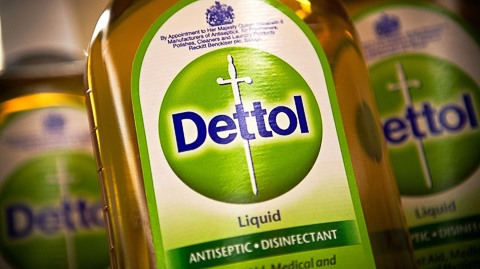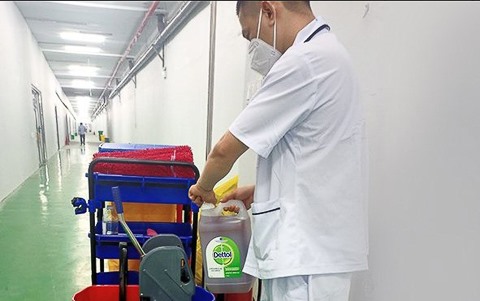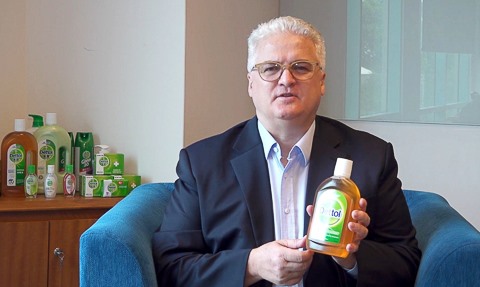 Brandinfo
Brandinfo

Dettol has been licensed by Vihema, Ministry of Health, which said it kills 99.9% of the SARS-CoV-2 virus that causes the Covid-19 pandemic.
The ministry’s department of health environment management said diluted Dettol liquid is effective at killing 99.99% of bacteria and viruses after 60 seconds of exposure, including the SARS-CoV-2 virus.

|
With its 90-year history, Dettol is used widely around the world to kill bacteria that can lead to diseases
Soren Bech, general director of Reckitt Vietnam, said, “Dettol disinfectant has made a great contribution to protecting public health since the Covid-19 pandemic broke out globally in 2020.
“Now, thanks to recognition by the Ministry of Health of Dettol’s effectiveness at killing almost all viruses and bacteria, it will continue to be trusted by people as an important means of preventing Covid outbreaks at home, in the community and at medical institutions.”

|
Thanks to recognition by the Ministry of Health, Dettol will continue to be an important tool in the prevention and control of SARS-CoV-2 at home, in the community and at medical institutions
In homes and offices, diluted Dettol can be used to clean floors, surfaces, sinks, etc. Regular cleaning with Dettol disinfectant kills harmful bacteria and helps families and employers prevent diseases and protect loved ones and staff.
In response to the discovery of SARS-CoV-2, Reckitt conducted independent laboratory studies in collaboration with Microbac to evaluate the effectiveness of Dettol in fighting viruses.
The American Journal of Infection Control recognised the results of Reckitt’s studies and published its findings at https://www.ajicjournal.org/article S0196-6553(20)30313-8/fulltext to confirm that Dettol is effective at killing 99.9% of the SARS-CoV-2 virus.
The research was comprehensive, covering the main ingredients in the categories and formulas used in all Dettol products like hand sanitisers, surface disinfectants, and soaps.

|
Dettol has been used at hospitals across the country during the Covid-19 outbreak to protect medical workers, their relatives and patients
Dettol received the 2020 Health Partnership Award for its Outstanding Community Service in Personal Hygiene in the Corporate Social Responsibility category.
In 2020 and 2021 Reckitt donated Dettol surface antibacterial products and hand sanitisers to field hospitals and children, obstetrics and gynaecology hospitals across the country.
This timely support from Dettol contributed to protecting doctors, medical staff, patients, and relatives.
Dettol has also been used for skin disinfection and personal hygiene for patients and medical staff, and to kill bacteria on clothes, a practice advised by health experts.
Dettol was launched in the UK in 1933.
The brand is now widely sold around the world and trusted by healthcare professionals and consumers alike.
In Vietnam, Dettol is sold in pharmacies, supermarkets and convenience stores and on e-commerce sites.
Reckitt is a growing corporation that brings to the world cleaner and healthier lives through various nutrition, health and disinfectant brands that are trusted and used by families in 190 countries and territories.
In Viet Nam, its main brands include Enfa, Strepsils, Durex, Gaviscon, and Dettol. Over the years, Reckitt Vietnam has cooperated with medical experts and the Ministry of Health for voluntary projects.
Starting in 2014 it collaborated with Metabolics to provide free specialised milk products for infants and children suffering from congenital metabolic disorders.
In 2019 Reckitt Vietnam and the Ministry of Health’s maternal and child health department launched a project to prevent neonatal jaundice at a cost of over VND10 billion.
Since then Reckitt has donated 100 phototherapy devices for the treatment of neonatal jaundice to 96 province- and district-level hospitals in 10 cities and provinces across the country.
It also supports development and training materials on early detection, diagnosis and treatment of the disease to healthcare workers and provision of information about the disease to parents.
Each phototherapy device can operate for at least 44,000 hours.
Health experts expect the 100 phototherapy devices to support the early treatment of neonatal jaundice in at least 150,000 newborns.




